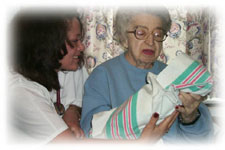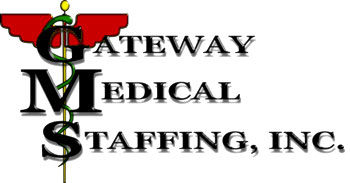Name:
|
|
Email:
|
|
|
1.
|
Residents in a long term health care facility and other people need to be independent for their own self esteem.
|
|
|
True
|
|
|
False
|
|
2.
|
If the nursing assistant is too busy to wait for a resident to do his or her own self care, the nursing assistant should go ahead and do all of the resident's self care.
|
|
|
True
|
|
|
False
|
|
3.
|
If a resident has cataracts, his/her eyes will appear cloudy.
|
|
|
True
|
|
|
False
|
|
4.
|
Aphasia is when a person loses the ability to speak.
|
|
|
True
|
|
|
False
|
|
5.
|
When a resident is considered chronically incontinent, that means that he or she is always grouchy.
|
|
|
True
|
|
|
False
|
|
6.
|
Dentures only need to be cleaned every ??? days
|
|
|
True
|
|
|
False
|
|
7.
|
Universal precautions state that you should _________
|
|
|
Assume all residents are infectious.
|
|
|
Assume all used needles are infectious.
|
|
|
Assume all bloods and fluids are infectious.
|
|
|
All of the Above.
|
|
8.
|
During your shift, a resident told you that she pretends that she swallows her medications and spits it out after the nurse leaves the room. You should _________
|
|
|
Tell the nursing assistant on the next shift.
|
|
|
Verify the story with the resident's roommate.
|
|
|
Call the resident's physician.
|
|
|
Tell the charge nurse immediately.
|
|
9.
|
Confidentiality of resident information pertains to _________
|
|
|
Only personal information about the resident.
|
|
|
Only information contained in the medical record.
|
|
|
Personal information and information contained in the medical record.
|
|
10.
|
Decubitus ulcers occur when _________
|
|
|
A bone is broken.
|
|
|
Someone eats too much spicy food.
|
|
|
Someone is left in the same position for a long period of time.
|
|
|
None of the Above.
|
|
11.
|
The first sign of decubitus ulcers is _________
|
|
|
Black and blue stripes.
|
|
|
White patches.
|
|
|
Intestinal gas.
|
|
|
None of the above.
|
|
12.
|
You should re-position a resident _________
|
|
|
At least every two hours.
|
|
|
Four or five times a day.
|
|
|
Now and then.
|
|
|
Only when requested.
|
|
13.
|
Which of the following equipment cannot be used for transfers?
|
|
|
Gait Belt
|
|
|
Mechanical Lift
|
|
|
Sliding Board
|
|
|
Foot Board
|
|
14.
|
You should note the amount of food eaten by a resident as _________
|
|
|
25%, 50%, 75%, 100%, None
|
|
|
At the usual amount.
|
|
|
Ate most of it.
|
|
|
Any of the Above.
|
|
15.
|
Common symptoms of Alzheimer's disease include _________
|
|
|
Memory Loss.
|
|
|
Confusion.
|
|
|
Learns easily.
|
|
|
Pain in the head area.
|
|
|
Both A and B are correct.
|
|
16.
|
When caring for an Alzheimer's patient, which communication skills should you use?
|
|
|
Ask one simple question at a time.
|
|
|
Speak using a loud tone.
|
|
|
Use positive body language.
|
|
|
Reword a question each time you don't get a response.
|
|
|
Use pictures or signs to communicate.
|
|
|
A, C, and E are correct.
|
|
17.
|
The safety and welfare of the resident is _________
|
|
|
Important only after the crisis has passed.
|
|
|
The responsibility of the nursing assistant.
|
|
|
Everyone's primary concern.
|
|
18.
|
When is important to have a gait belt with you?
|
|
|
At all times.
|
|
|
Only when transferring a heavy patient.
|
|
|
When rolling a patient over on side.
|
|
|
When you transfer a patient who has a hoyer lift at the bedside.
|
|
19.
|
What does hypertension mean?
|
|
|
Blood sugar is up.
|
|
|
Blood sugar is low.
|
|
|
Blood pressure is high.
|
|
|
Blood pressure is low.
|
|
20.
|
If an error is made while charting in a resident's medical record, you should _________
|
|
|
Ignore it.
|
|
|
Color over it until it is no longer readable.
|
|
|
Draw a simple line through it, initial it, and write a brief explanation.
|
|
|
Report it to the charge nurse.
|
|
21.
|
What is the universal distress signal for choking?
|
|
|
One hand grasping the throat.
|
|
|
Holding your breath.
|
|
|
Inserting the index finger into your mouth.
|
|
|
All of the above, done at the same time.
|
|
22.
|
If the CMT or nurse asks you to give Milk of Magnesia to a patient, you should _________
|
|
|
Give in slow sips.
|
|
|
Refuse to administer medicine.
|
|
|
Follow with 8oz of water.
|
|
|
Tell the charge nurse that the medicine was given.
|
|
23.
|
Some common symptoms of a depressed resident include _________
|
|
|
Low self-esteem
|
|
|
Headaches
|
|
|
Poor Circulation
|
|
|
Incontinence
|
|
|
Poor Appetite
|
|
|
A, B and E are correct.
|
|
24.
|
Common losses among nursing home residents include _________
|
|
|
Privacy
|
|
|
Independence
|
|
|
Home
|
|
|
Pets
|
|
|
Personal Possessions
|
|
|
All of the above.
|
|
25.
|
When re-positioning a resident you should _________
|
|
|
Never allow them to help; they may hurt themselves.
|
|
|
Allow them to help on occasion, so they feel useful.
|
|
|
Let them do it themselves, without any help or guidance.
|
|
|
Allow them to help as much as they are capable; this helps to develop muscles.
|
|
26.
|
Symptoms of a stroke include _________
|
|
|
Headaches
|
|
|
Slurred Speech
|
|
|
Confusion
|
|
|
All of the above.
|
|
27.
|
Red meat, cheese, liver, chicken and fish are all sources of _________
|
|
|
Fat
|
|
|
Protein
|
|
|
Natural Sugar
|
|
|
Complex Carbohydrate
|
|
28.
|
Diabetic residents are prone to _________
|
|
|
Depression
|
|
|
Poor Circulation
|
|
|
Alzheimer's Disease
|
|
|
AIDS
|
|
29.
|
Some examples of accident hazards include _________
|
|
|
Leaving a wet floor unattended without a barrier.
|
|
|
Rearranging furniture.
|
|
|
Smoking in bed.
|
|
|
Feeding a resident too much food too quickly.
|
|
|
All of the above.
|
|
30.
|
A stage one decubitis _________
|
|
|
Is a bruised area.
|
|
|
Is black and necrotic.
|
|
|
Exposed bone and tissue.
|
|
|
Reddened area that does not go away with gentle massage.
|
|



